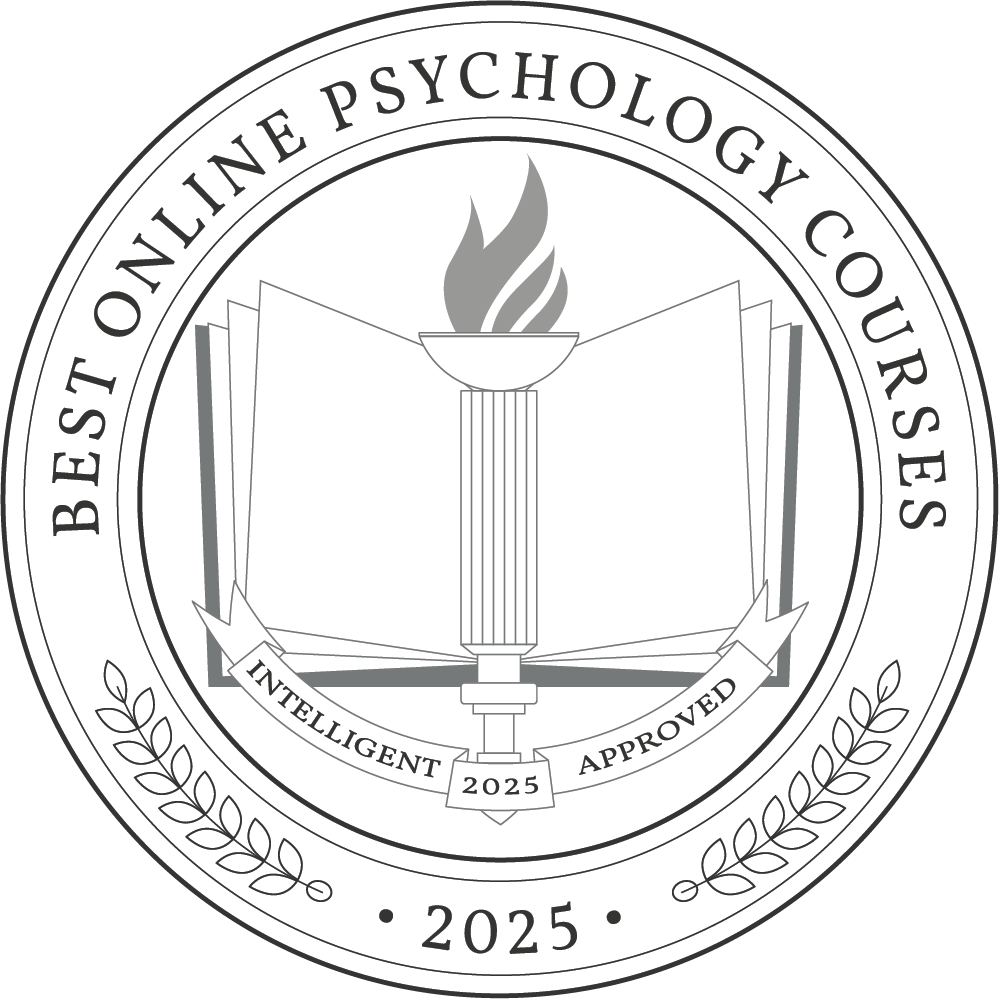Whether you know little about the field or are a practicing psychologist, an online psychology course can be a great idea for numerous reasons. For beginners, the chance to dive into an introductory course that is both entertaining and informational is a great way to start your study. For those with experience, it can be a chance to learn about new trends and expand your skill set.
- Coursera — Introduction to Psychology — Top Pick
- Coursera — The Arts and Science of Relationships: Understanding Human Needs — Best for Social Workers
- Coursera — Positive Psychology — Best for Practicing Psychologists
- Coursera — Foundations of Positive Psychology Certification — Best Free Trial
- Udacity — Intro to Psychology — Most Affordable
- Udemy — Advanced Level Psychology Certificate — Best Professional Outcomes
- Udemy — How to “Get” People: Practical Psychology — Shortest Course
Our Ranking Criteria
The best online psychology courses offer a mix of theory and hands-on practice to help you excel and reach your academic goals. For our list, we looked at all the courses attracting the most students and assessed them to find the ones that best deliver on their promises. We based our decisions on both basic and advanced criteria.
Basic ranking criteria
First, we looked at the basic factors each class should possess to provide a solid educational experience. We expected every course to meet these four requirements.
Time to complete. We looked for those who took the time needed to convey the material properly without wasting your time. Most of our classes can be completed in less than six months to a few weeks or less.
Prerequisites required. None of our final chosen courses had prerequisites. This means they are accessible to anyone with little background knowledge of psychology.
Flexible schedule. All but one of our choices allow you to set the pace for your learning experience. That allows you to shape your coursework around personal and professional commitments.
Certificate of completion. Most of our courses feature a certificate of completion you can add to your resume or LinkedIn profile, although some charge a fee for this service. A certificate can be valuable, showing you are engaged in professional development.
Advanced ranking criteria
Then, we examined each course more closely based on more advanced ranking criteria. Although each course has a unique focus, we expected it to adhere to these standards.
- Instructors who are credentialed in psychology and have teaching experience at the university level.
- Instructors who are engaging speakers capable of providing lectures that bring the material alive.
- Students have the chance to assess their learning through quizzes or practical assignments.
- The material covered reflects the current psychological practice and up-to-date information.
- Student reviews, when available, are generally positive and affirming.
- The course does not require specialized software or technology beyond what the average student has available.
- Students can start the course either when it is convenient for them or at a start date that is repeated regularly.
- The goals for the course are clear from the beginning and are stated on the website.
The 7 Best Online Psychology Courses
Coursera
Introduction to Psychology
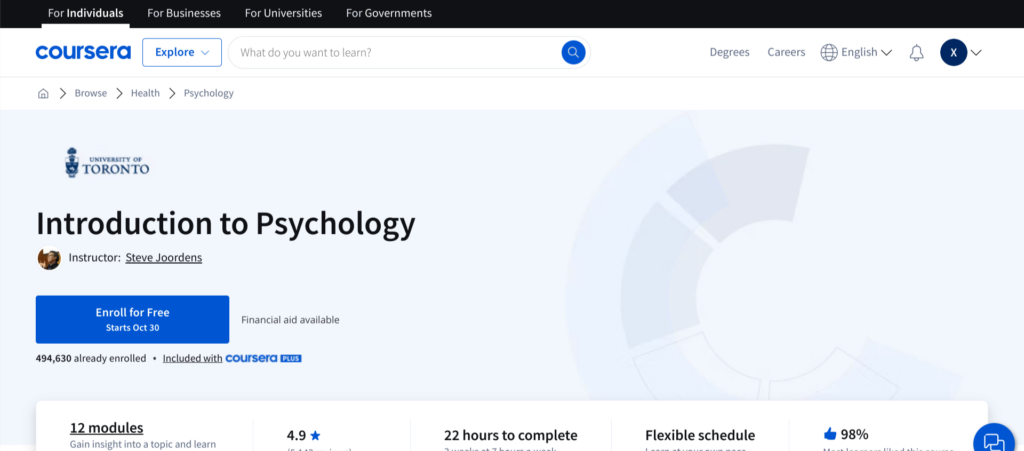
Intelligent Award: Top Pick
Developed with the University of Toronto, Coursera’s Introduction to Psychology offers a broad overview of topics, including experimental psychology and how it impacts our understanding of human behavior, the brain and its cognitive abilities, and mental illness and its treatments. The class is taught by Professor Steve Joordens, who has won many teaching awards from the University of Toronto and is known for his innovative and engaging lecture style. The course is free if you are taking it for personal enrichment but only costs $49 if you want a certificate upon completion.
- Price: Free to audit; $49 with certificate
- Time to complete: About 22 hours
- Prerequisites required: None
- Flexible schedule: Yes
- Includes verified certificate of participation: Yes, for a fee
Who should take this course? This is a great course for the intellectually curious. If you consider yourself a life-long learner open to exploring new topics, the instructor is excellent at explaining his topics in an accessible and interesting manner.
| What we like | What we don’t like |
| Financial aid is available | Certificate only available at a cost |
| An engaging and entertaining lecturer | No personal interaction with the instructor |
| A broad range of psychological topics |
Coursera
The Arts and Science of Relationships: Understanding Human Needs
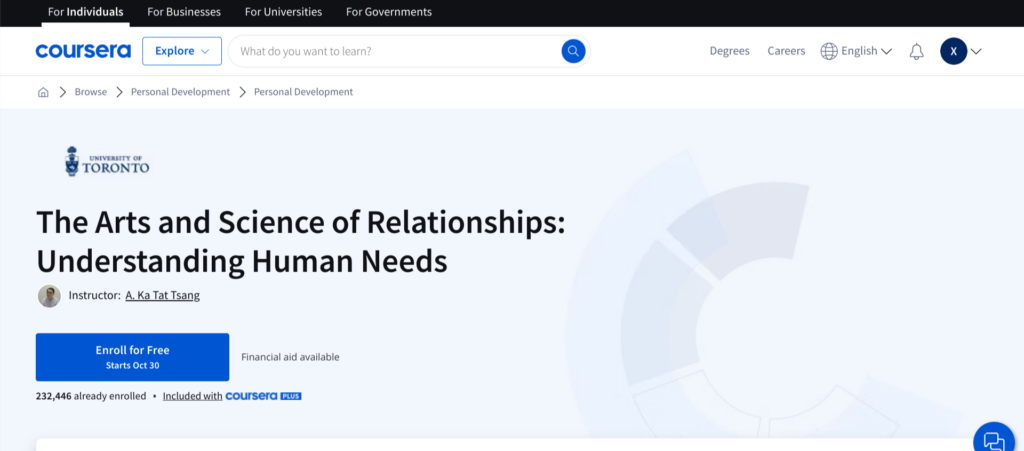
Intelligent Award: Best for Social Workers
Developed and offered by the University of Toronto, this course focuses on the Strategies and Skills Learning and Development (SSLD) System, a model that helps learners master ways to attain personal goals within a social environment. The instructor for the course is A. Ka Tat Tsang, a professor of social work who developed SSLD and teaches globally at the university level. You’ll learn the basic principles of SSLD and their relevance for everyday relationships, along with case studies that illustrate how these relationships work within the system. Students will participate in observation learning, simulations, and real-life implementations.
- Price: Free to audit; $49 with certificate
- Time to complete: Approximately 31 hours
- Prerequisites required: None
- Flexible schedule: Yes
- Includes verified certificate of participation: Yes, for a fee
Who should take this course? Students of psychology and social work who are interested in learning about the SSLD model for interpersonal and societal relationships, as well as professionals in social work and related fields who require an in-depth understanding of social interactions.
| What we like | What we don’t like |
| Includes videos, readings, and multiple quizzes | Learning is focused on one system (SSLD) |
| Financial aid available | Video segments are short and choppy |
Coursera
Positive Psychology
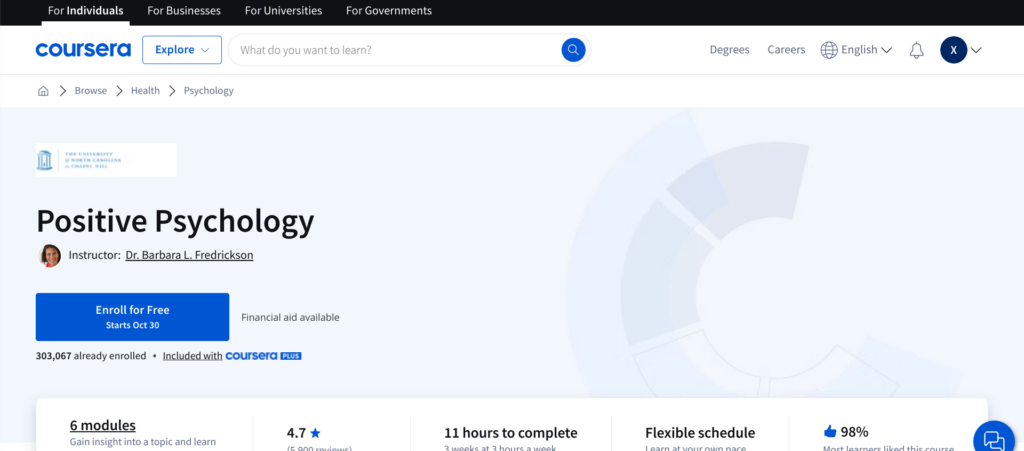
Intelligent Award: Best for Practicing Psychologists
This course addresses an interesting subset of psychological study. Positive psychology closely examines the strengths that enable individuals and communities to thrive. As the name suggests, it is an uplifting area of study based on the belief that people want to lead meaningful and fulfilling lives and nurture all that is best within themselves. The course is offered by the University of North Carolina at Chapel Hill and taught by Dr. Barbara L. Fredrickson, a distinguished professor of psychology at the school and president-elect of the International Positive Psychology Association. You’ll study positive emotions, the outcomes of positivity, and positivity resonance and look at how happiness benefits relationships and the community.
- Price: Free to audit; $49 with certificate
- Time to complete: Approximately 11 hours
- Prerequisites required: None
- Flexible schedule: Yes
- Includes verified certificate of participation: Yes, for a fee
Who should take this course? Anyone curious about the features of positive psychology, including psychologists and psychology students who want to expand their area of expertise.
| What we like | What we don’t like |
| Focuses on a unique area of study in the field | Not a general psychology course |
| Financial aid is available | Best for those with some understanding of psychology |
Coursera
Foundations of Positive Psychology Certification
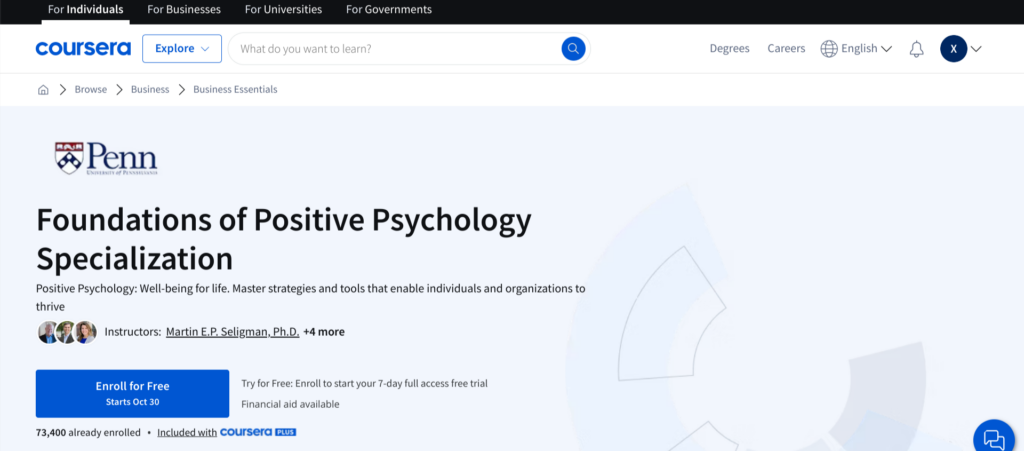
Intelligent Award: Best Free Trial
The University of Pennsylvania, an Ivy League institution with excellent faculty offers this comprehensive course. All five professors teaching this course hold doctorates in psychology. The course offers strategies and tools to help individuals and organizations thrive and allows students to explore the world of positive psychology. This five-course specialization leads to a certificate signed by Dr. Martin E. P. Seligman, the Zellerbach Family Professor of Psychology and Director of Penn’s Positive Psychology Center. The five courses culminate in a project that brings all the coursework from the first four courses together as you develop and test a positive intervention for an audience of your choice.
- Price: $79/month
- Time to complete: Approximately two months at 10 hours per week of work
- Prerequisites required: None
- Flexible schedule: Yes
- Includes verified certificate of participation: Yes
Who should take this course? This course is a good introduction to the world of positive psychology for those interested in making a career change or learning a new topic in psychology.
| What we like | What we don’t like |
| Instructors at the top of their field | Focus is only on positive psychology |
| Includes hands-on project | The course takes a while to complete |
Udacity
Intro to Psychology
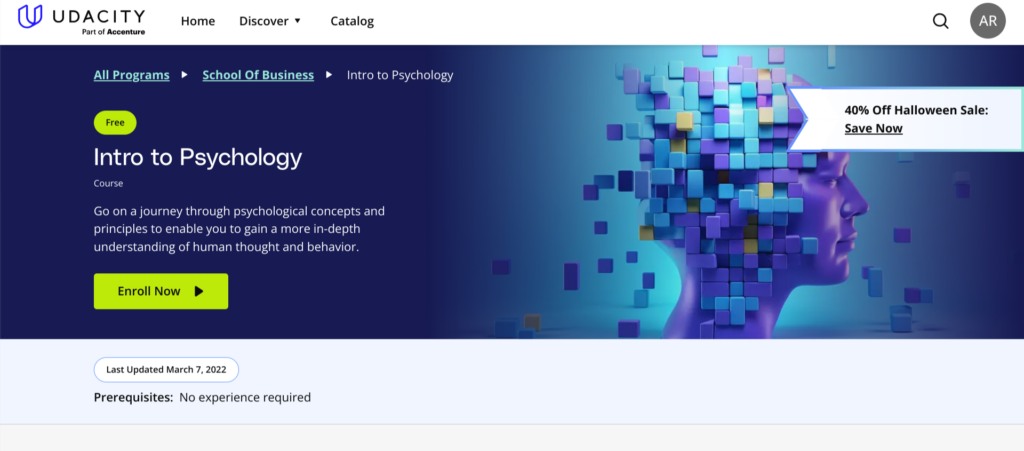
Intelligent Award: Most Affordable
Udacity’s Intro to Psychology course is taught by professors at San Jose State University. They gear this free course toward the beginner; the only prerequisite, they say, is “curiosity about human nature.” Among other topics, the course helps students analyze the social element of society, look at the dynamics of ethnic, cultural, and other identities, and evaluate social science information. Each of the nine lessons centers around a particular area of psychological studies, such as consciousness and perception. In addition to the video lessons, there are exercises you will complete and interactive quizzes that allow you to test your understanding.
- Price: Free
- Time to complete: Approximately one month
- Prerequisites required: None
- Flexible schedule: Yes
- Includes verified certificate of participation: No
Who should take this course? This free course would benefit anyone looking to learn more about the science of psychology without incurring a high cost.
| What we like | What we don’t like |
| Course is free | No certificate available |
| Instructors are university-level professors | |
| Focus on thought and behavior |
Udemy
Advanced Level Psychology
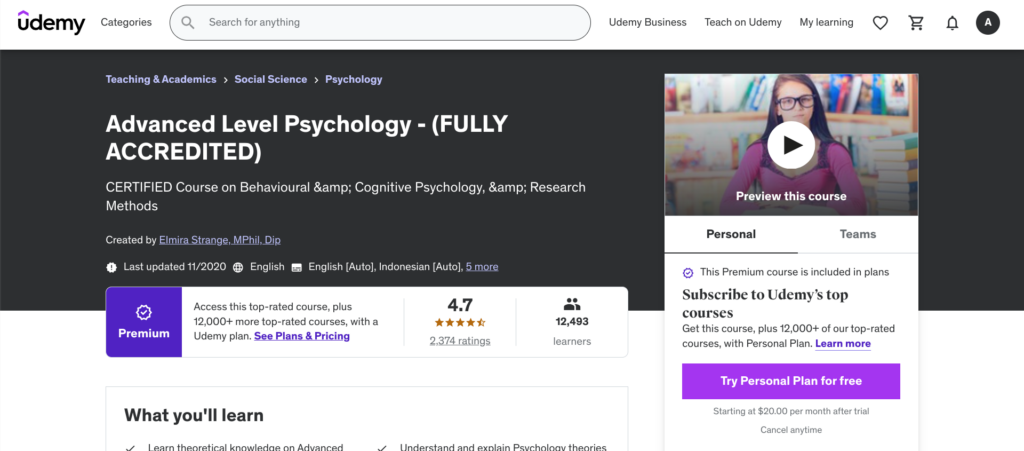
Intelligent Award: Best Professional Outcomes
As the title suggests, this course goes beyond the beginner-level classes that comprise most of our list. It’s taught by motivational psychologist Elmira Strange, a senior researcher and psychology lecturer at colleges in the U.K., and is now an online entrepreneur of psychology-based materials. In this class, you’ll learn about psychological theory, applied social and cognitive psychology, research methods and why they are important, child development, and current debates in the field. The course assumes some basic understanding of psychology, but much of the material is accessible to anyone with basic education. A certificate is available, and the course is fully accredited by the International Association of Therapists (IAOTH).
- Price: $89.99
- Time to complete: Four hours
- Prerequisites required: None
- Flexible schedule: Yes
- Includes verified certificate of participation: Yes
Who should take this course? This course is best for people considering a career in psychology or brushing up on skills they have from previous studies.
| What we like | What we don’t like |
| Lifetime access to the course | Not the best choice for beginners |
| Accredited by IAOTH | Reviews suggest more examples during lectures would be helpful |
| Engaging and knowledgeable Instructor |
Udemy
How to “Get” People: Practical Psychology
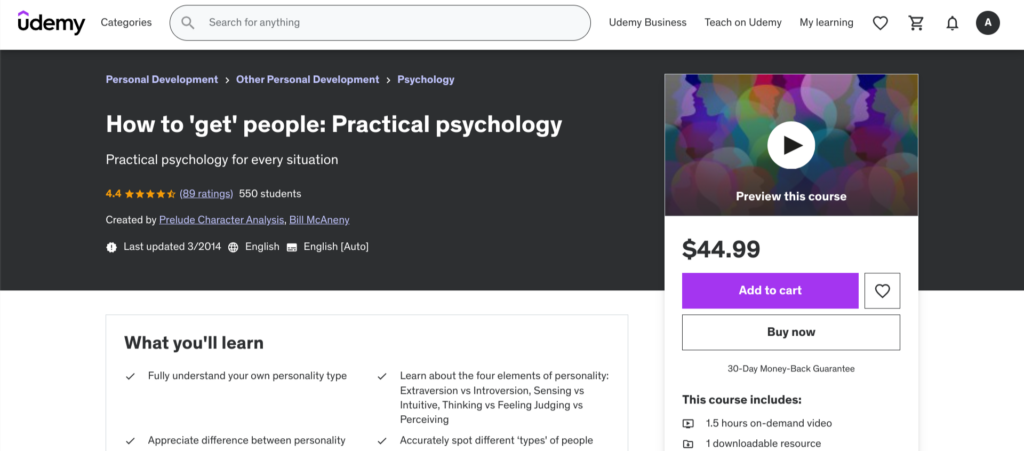
Intelligent Award: Shortest Course
Taught by organizational psychologist and author Bill McAneny, this course delves into how we interact with others and influence people and situations to improve our ideas’ outcomes. McAneny helps you to understand your personality type and appreciate the difference between personality and behavior. You’ll learn about four elements of personality: extraversion vs. introversion, sensing vs. intuitive, thinking vs. feeling, and judging vs. perceiving, and see why each element is important in understanding how to work effectively with people. This practical course is a great primer for those who want to know how to handle conflict and motivate others to get the best out of them.
- Price: $44.99
- Time to complete: 1.5 hours
- Prerequisites required: None
- Flexible schedule: Yes
- Includes verified certificate of participation: Yes
Who should take this course? Those looking for practical information will help them understand what makes people tick and how to work and mediate more effectively, no matter their personality.
| What we like | What we don’t like |
| Lifetime access to the course | The course is only 1.5 hours |
| Certificate available on completion | Just one downloadable resource |
| Good for those in managerial positions |
Online Course Comparison Chart
| Course | Price | Features |
| Coursera — Introduction to Psychology — Top Pick | Free or $49 with a certificate | ✓ No prerequisites required
✓ Flexible schedule ✓ Includes verified certificate of participation |
| Coursera — The Arts and Science of Relationships: Understanding Human Needs — Best for Social Workers | Free or $49 with a certificate | ✓ No prerequisites required
✓ Flexible schedule ✓ Includes verified certificate of participation |
| Coursera — Positive Psychology — Best for Practicing Psychologists | Free or $49 with a certificate | ✓ No prerequisites required
✓ Flexible schedule ✓ Includes verified certificate of participation |
| Coursera — Foundations of Positive Psychology Certification — Best Instructors | $79/month | ✓ No prerequisites required
✓ Flexible schedule ✓ Includes verified certificate of participation |
| Udacity — Intro to Psychology — Most Affordable | Free | ✓ No prerequisites required
✓ Flexible schedule X Includes verified certificate of participation |
| Udemy — Advanced Level Psychology — Best Professional Outcomes | $89.99 | ✓ No prerequisites required
✓ Flexible schedule ✓ Includes verified certificate of participation |
| Udemy — How to “Get” People: Practical Psychology — Shortest Course | $44.99 | ✓ No prerequisites required
✓ Flexible schedule ✓ Includes verified certificate of participation |
Tips for Succeeding in an Online Psychology Course
1. Consider the cost
How much do online psychology classes cost?
There are many reasonably priced online psychology courses available. Most of the options covered in this guide will cost you less than $100. If you are taking the course for personal enrichment and not interested in earning a certificate of completion, you will find quite a few, such as many of the classes offered by Coursera, that are completely free.
Will my employer pay for me to take the course?
If your psychology class allows you to perform your job at a higher level or meets the professional requirements of your employer, they may be willing to pay all or part of the class fees. It is worth a conversation with your supervisor or your company’s HR department head to see if they are open to supporting you in this way.
2. Get your tech squared away
You shouldn’t need any special tech to take these online psychology courses. A few companies, such as Udacity, allow you to test your system for compatibility. Generally, you will need a fairly up-to-date operating system, such as Windows 7 or higher for PCs and Mac OS X 10 or higher for Apple products. You’ll also need a solid internet connection, with a download speed of at least 1 Mbps and an upload speed of 0.5 Mbps. Most of our chosen courses are compatible with smartphones and other devices. If you are using Chrome, consider downloading the Video Speed Controller app, which allows you to speed up or slow down video lectures and rewind or fast forward.
3. Use the right study resources
Depending on what area of psychology you are interested in — child psychology, forensic psychology, marriage and family therapy, or something else — there is probably an organization with an information-packed website that includes resources for psychology students. An example would be the National Association of School Psychologists, which features resources, publications, standards, and more for those interested in working as a psychologist in a primary or secondary school.
There are numerous books available that are geared toward those learning about psychology. Two that we like are The Psychology Book: Big Ideas Simply Explained by DK Publishing and Psychology: Everything You Need to Know to Master the Subject by Alan Porter.
Frequently Asked Questions About Psychology Courses?
What jobs can you get after completing an online psychology course?
According to the Occupational Outlook Handbook, working as a psychologist usually requires a doctoral degree and residency and leads to a median pay of $92,740 per year. However, many other career options are open for those with an understanding of psychology. These include management and other business and industry positions, educational instruction and library work, and administrative and office support occupations.
Are there free online psychology courses?
Yes, half of our chosen courses have free options. Usually, free courses do not include a certificate or the ability to interact with the instructor. You will, however, be able to access all course videos and any downloadable materials that the instructor recommends. Free courses can be a great way to dip your toes in the water without any financial commitment.
How long is the average online psychology course?
Online psychology courses range from a few hours to several months in length. Our shortest course is 1.5 hours, so you can increase your skill set without a huge time commitment. On the other hand, the longest course in this guide takes most students about two months to complete at a pace of 10 hours of study per week.
Can you become a psychologist with an online degree?
This would depend on the nature of your online degree and the institution delivering it. In the U.S., you would need to be working toward your online degree from an accredited college or university. It would take several years and might require an in-person residency period. None of our recommended courses lead directly to an academic degree and are best taken for enjoyment or professional development purposes.
Interested in a degree instead?
Learn more about online degrees, their start dates, transferring credits, availability of financial aid, and more by contacting the universities below.
